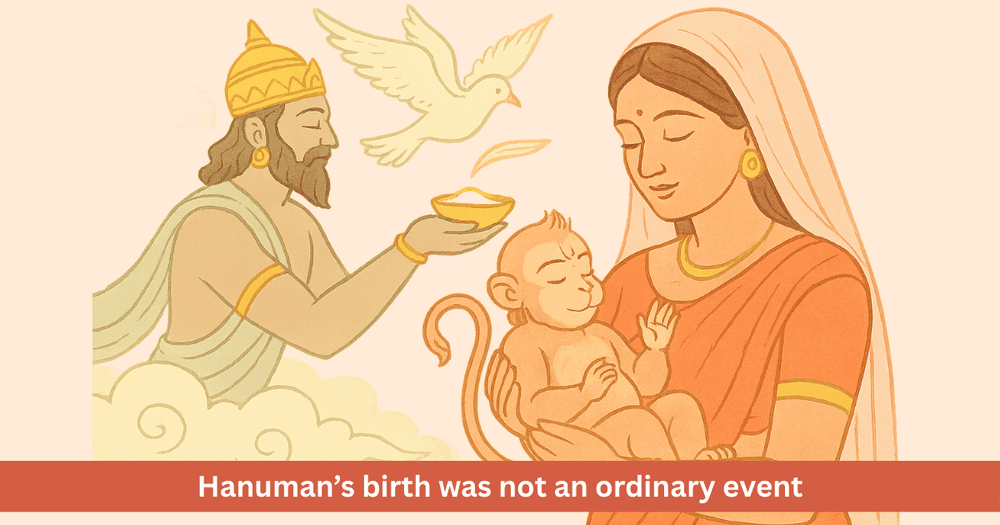What Is the Birth and Significance of Pavanputra Hanuman
By Pt. Suvrat Sharma
An explanation of Hanuman’s divine birth, the name Pavanputra and his spiritual legacy

Table of Contents
In the vast canvas of Indian tradition, the figure of Pavanputra Hanuman shines with a unique brilliance. His life is not simply a tale from ancient scriptures but a timeless source of guidance and inspiration. The very sound of his name fills the heart with courage and devotion.
The Divine Birth of Hanuman: A Union of Cosmic Forces
The birth of Hanuman was no ordinary event. It was the result of divine will and cosmic forces working together. According to the Valmiki Ramayana, Anjana, a celestial nymph cursed to be born as a monkey, undertook severe penance to Lord Shiva. Pleased with her devotion, Shiva blessed her with a son who would embody his divine energy.
At the same time, King Dasharatha of Ayodhya performed the Putrakameshti Yajna. A portion of the sacred pudding produced from the ritual was carried by a celestial bird. Vayu, the Wind God, received it and offered it to Anjana. When Anjana consumed it, Hanuman was born, carrying within him the blessings of both Shiva and Vayu. This is why he is called Pavanputra, the son of the Wind God.
The Deep Meaning of the Name Pavanputra
The title Pavanputra is not merely a name. Pavan or wind, represents prana, the vital life force. Life without breath is impossible. Thus Hanuman’s birth reminds us that divinity is present in every breath. Each inhalation is an invitation to experience the closeness of the divine.
The role of Vayu also conveys a profound teaching. Although a powerful deity, Vayu acted only as a medium in Hanuman’s birth. His role was humble and selfless. This shows that true strength lies not in dominance but in service and humility.
Hanuman’s Divine Qualities: A Blend of Strength and Devotion
The life of Hanuman embodies virtues that inspire across ages.
| Quality | Example | Teaching |
|---|---|---|
| Strength and Courage | Leaping across to Lanka, carrying the Sanjeevani mountain | Strength must always serve dharma and justice |
| Devotion and Loyalty | Complete surrender to Lord Rama | True devotion conquers every challenge |
| Humility | Calling himself only the servant of Rama | The path of surrender is higher than pride |
His courage was not for self-display but for the protection of righteousness. His devotion was not limited to prayer but was present in every action aligned with Rama’s name.
The Spiritual Legacy of Hanuman
Hanuman is worshipped not only for his strength but also for his example as the ideal devotee. His life shows that devotion means more than ritual. It is the surrender of ego and the offering of one’s life in service to the divine and to humanity.
Temples dedicated to Hanuman are found across India. Devotees worship him for courage, protection and strength. At the same time, he inspires people to go beyond their limitations and realize their divine potential.
What Lessons Does Hanuman Give for Life?
Pavanputra Hanuman is not just a character of sacred texts. He is a living symbol of spiritual guidance. His life teaches us that strength must be used in service, devotion is the highest path and knowledge guides us to fulfillment.
Through Hanuman we underst and that every breath contains the presence of divinity. If we embrace humility, surrender and service, life naturally becomes meaningful and complete.
Frequently Asked Questions (FAQs)
Q1. How was Hanuman born?
He was born through Anjana’s penance and the blessings of Shiva and Vayu.
Q2. What is the significance of the name Pavanputra?
It shows that Hanuman symbolizes the union of prana, the life force and divine energy.
Q3. What are Hanuman’s main qualities?
Strength, courage, devotion, loyalty and humility.
Q4. Why is Hanuman called the ideal devotee?
Because he surrendered his ego and dedicated his entire life to the service of Lord Rama.
Q5. What inspiration do devotees receive from Hanuman’s life?
They learn the values of service, devotion, surrender and unshakable faith.
What does Nakshatra reveal about me?
My NakshatraDid you like it?
Author

Pt. Suvrat Sharma (50)
Experience: 27
Consults About: Marriage, Career, Property
Clients In: Chhattisgarh, MP, Delhi, Odisha
Share this article with friends and family